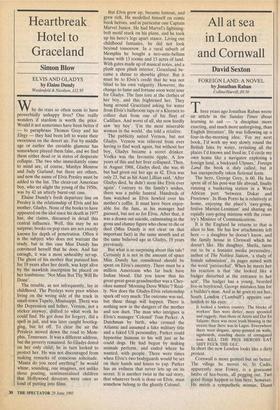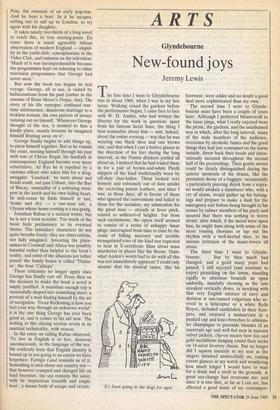All at sea in London and Cornwall
David Sexton
FOREIGN LAND: A NOVEL by Jonathan Raban CollinslHarvill, £9.50 Three years ago Jonathan Raban wrote an article in the Sunday Times about learning to sail — 'a discipline more exacting, and much more unforgiving, than English literature'. He was following up a four-in-the-morning idea: 'For my next book, I'd work my way slowly round the British Isles by water, revisiting all the places I'd known and lived in; I'd circle my own home like a navigator exploring a foreign land, a backyard Ulysses.' Foreign Land the book is duly called, but it has unexpectedly taken fictional form.
The hero, George Grey, is 60. He has spent all of his post-war life abroad, finally running a bunkering station in a West African port 'between Dakar and Freetown'. In Born Porto he is relatively at home, enjoying the place's 'easy-going, festive Marxist-Leninism' and sharing an equally easy-going mistress with the coun- try's Minister of Communications.
It is the England he returns to that is alien to him. He has few attachments left here — a daughter he doesn't know, anJ the family house in Cbrnwall which he doesn't like. His daughter, Sheila, turns out to be a feminist media personality, author of The Noblest Station, 'a study of female submission', its pages mined with the word 'patriarchal'. When he meets her his reaction is that 'she looked like a badger disturbed at the entrance to her sett'. The badger has a young, bearded live-in boyfriend; George mistakes him for a builder's man. And as he goes to see her, South London (`Lambuff') appears out- landish to his eyes: It looked a lawless country. The blocks of workers' flats were dirtier, more sprawled and raggedy, than those of Accra and Dar Es Salaam; there was more trash blowing in the streets than there was in Lagos. Everywhere there were slogans, spray-gunned on walls, signboards, standing sheets of corrugated iron. KILL THE PIGS HEROIN EAT SHIT FUCK THE GLC.
In short the new London looks like a dirty protest.
Cornwall is more genteel but no better. The village he moves to, St Cadix, apparently near Fowey, is a gruesome limbo of has-beens, all pegging out. Two good things happen to him here, however. He meets a sympathetic woman, Diana Pym, the remnant of an early pop-star. And he buys a boat. In it he escapes, setting out to sail up to London, to try again with his daughter.
It takes nearly two-thirds of a long novel to reach this, its true starting-point. En route there is much agreeably bilious observation of modern England — stupid- ity in the yacht-club, concupiscence in the Video Club, and rumness on the television: 'Much of it was incomprehensible because the programmes kept on referring to other television programmes that George had never seen.'
But now the book too begins its real voyage. George, all at sea, is visited by hallucinations from his past (rather in the manner of Brian Moore's Fergus, this). The story of his life emerges: confused war- time adolescence, disastrous marriage to a feckless woman, his own pattern of always running out on himself. 'Whenever George thought of the sea, it seemed to him a kindly place, mainly because he imagined himself floating away on it'.
George finally begins to add things up, to piece himself together. But as he rounds the coast, nursing himself through his past with tots of Chivas Regal, his landfalls in contemporary England become ever more rebarbative. At Rye he is repelled by a customs officer who takes him for a drug- smuggler. landsick', he turns about and heads south, out past Ushant, into the Bay of Biscay, unmindful of a softening stem- post in the ketch and his own failing heart.
In mid-ocean he finds himself at last, 'home and dry' — a one-man ark, a Ulysses whose home-coming is a sea-going. Jonathan Raban is a natural writer, but he is not a born novelist. Too much of the book feels preliminary to its eventual theme. The subsidiary characters do not quite breathe freely; they are observations, not fully imagined. Inventing the place- names in Cornwall and Africa was possibly harmful rather than helpful to the book's reality, and some of the allusions are rather posed: the family house is called Thalas- sa', the boat 'Calliope'.
These criticisms no longer apply once George has finally cast off. From then on the decision to make the book a novel is amply justified. A mundane enough trip is successfully shaped into something more: a portrait of a man finding himself by the art of navigation. 'Dead Reckoning is how you feel your way through an unknown world': it is the one thing George has ever been good at, and it comes to his aid now. The writing in this closing section revels in its nautical technicality, with reason.
In the essay on sailing Raban observed, `To live in English is to live, however unconsciously, in the language of the sea.' He evidently feels that English identity is bound up in sea-going to an extent we have forgotten; Foreign Land reminds us of it. Something is seen about our country too — that however cramped and changed life on land becomes, the sea remains the same, with its 'mysterious breadth and empti- ness', a means both of escape and return.



























































 Previous page
Previous page